(Content courtesy the University of the West Indies)
[gss ids=”24412,24413,24414,24415,24416,24417,24418,24419,24420,24421,24422,24423,24424,24425,24426,24427,24428,24429,24430,24431,24432,24433,24434,24435,24436″]Prominent Historian Prof. Sir Hilary Beckles installed as head of the University of the West Indies (UWI)
On Saturday 30 May, 2015 The University of the West Indies (UWI) officially installed Professor Sir Hilary Beckles as its 8th Vice-Chancellor. The installation ceremony took place at the Usain Bolt Sports Complex, Paradise Park, UWI Cave Hill Campus in Barbados.
Significance of the Vice-Chancellor’s Installation
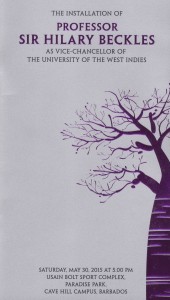 This ceremonial installation, steeped in University tradition, and hosted by The UWI Chancellor, Sir George Alleyne, points to a significant intersection of tradition and renewal in the life of the regional institution. It is an important rite signalling the conferment of authority and the formal welcoming of the incoming Vice-Chancellor into the academy. Attended by three CARICOM prime ministers (Hon. Freundel Stuart of Barbados, Hon. Dr. Ralph Gonsalves of St. Vincent & the Grenadines and Hon. Perry Christie of the Bahamas) along with representatives of other regional governments, members of the diplomatic corps in Barbados, business, other academic and international organizations and leaders of Caribbean civil society, and members of the University staff from across the region. The special ceremony incorporated centuries-old elements such as academic regalia, the Flag, Academic and Chancellor’s processions, and the mace; which are based on the tradition of the medieval university.
This ceremonial installation, steeped in University tradition, and hosted by The UWI Chancellor, Sir George Alleyne, points to a significant intersection of tradition and renewal in the life of the regional institution. It is an important rite signalling the conferment of authority and the formal welcoming of the incoming Vice-Chancellor into the academy. Attended by three CARICOM prime ministers (Hon. Freundel Stuart of Barbados, Hon. Dr. Ralph Gonsalves of St. Vincent & the Grenadines and Hon. Perry Christie of the Bahamas) along with representatives of other regional governments, members of the diplomatic corps in Barbados, business, other academic and international organizations and leaders of Caribbean civil society, and members of the University staff from across the region. The special ceremony incorporated centuries-old elements such as academic regalia, the Flag, Academic and Chancellor’s processions, and the mace; which are based on the tradition of the medieval university.
About the role of the Vice-Chancellor
The Vice-Chancellor is the principal academic and administrative officer of the regional institution, The University of the West Indies. The Vice-Chancellor of The UWI is charged with advancing the University’s academic reputation and global standing, while championing the direction outlined in the strategic plan for the remaining period of the 2012-2017 plan and beyond. Pursuant to Statute 5(a) “The Vice Chancellor shall be ex-officio Chair of the Senate and, save in the case of committees under Statute 10.4 and of excepted Committees, of all committees of the Council and Senate provided that the Vice-Chancellor may appoint any person being a member of the University to be Chair of any such Committee.” The Vice Chancellor, by Statute 6, is charged with maintaining and promoting the efficiency and good order of the University for which the Vice-Chancellor shall be responsible to the Council. In concert with Campus principals, he provides strategic direction and leadership and helps to position and present The University internationally, nationally and regionally. He works closely with the campuses to ensure a coherent vision across all the constituent parts of the University so that its governance, management and administration are efficient and effective. He also carries out important ceremonial and civic duties including officiating at matriculation and degree ceremonies.
About Professor Sir Hilary Beckles
Before assuming the office of Vice-Chancellor of The University of the West Indies on May 1, 2015, Professor Sir Hilary was Principal and Pro Vice-Chancellor of The University of the West Indies, Cave Hill Campus, Barbados for thirteen years (2002-2015). Sir Hilary has emerged as a distinguished university administrator, internationally reputed Economic Historian, and transformational leader in higher education. He has had a spectacular journey within The UWI, entering as a temporary assistant lecturer in 1979 at the Mona campus. In short time he was promoted to senior lecturer and then to the rank of Reader. In 1991, at age 36, he was promoted to a Personal Professorship, then the youngest in the history of the university.
The international recognition of his competence has been global. He is Vice President of the International Task force for the UNESCO Slave Route Project; a consultant for the UNESCO Cities for Peace Global Programme; and in 2014 was appointed by the Secretary General of the United Nations, Ban Ki-Moon, to his inaugural United Nations Secretary-General’s Scientific Advisory Board on sustainable development.
Sir Hilary is, in addition, a respected playwright and member of the theatre community. Eight of his plays have been staged to popular acclaim. In the corporate community his footprint is well established. He is a long serving director of Sagicor Financial Corporation, and has served as a director of its principal subsidiaries Sagicor Jamaica Ltd, and Sagicor Barbados Ltd. He is a director of Cable and Wireless Barbados Ltd, and is Chairman of The University of the West Indies Press.
Sir Hilary received his higher education in the United Kingdom and graduated with a BA (Hons) degree in Economic and Social History from Hull University in 1976, and a PhD from the same university in 1980. He has received numerous awards including Honorary Doctor of Letters (Brock); (Glasgow); (Hull); (KNUST), in recognition of his major contribution to academic research into transatlantic slavery, popular culture, and sport. He is an editor of the UNESCO General History of Africa series.
Sir Hilary was made a Commander Knight of St Andrew (KA), Barbados’ highest honour, in recognition of his distinguished service in the field of education, in particular at university level, and his dedication to the furtherance of the arts and sport in particular cricket. He has lectured extensively in Europe, Africa, Asia and the Americas and has published more than ten academic books including Britain’s Black Debt: Reparations for Slavery in the Caribbean (2013); Centering Woman: Gender Discourses in Caribbean Slave Society (1999); White Servitude and Black Slavery in Barbados 1627-1715 (1990); The History of Barbados (1990); Natural Rebels: A History of Enslaved Black Women in the Caribbean (1989); The Development of West Indies Cricket: Volume One, The Age of Nationalism; and Volume Two, The Age of Globalisation, (1999); A Nation Imagined: The First West Indies Test Team: The 1928 Tour (2003).
He is Chairman of the Caribbean Community [CARICOM] Commission on Reparation and Social Justice. Sir Hilary is Founder and Director of the CLR James Centre for Cricket Research at Cave Hill Campus, and a former member of the West Indies Cricket Board (WICB). He is Founder and inaugural Chairman of the Sagicor High Performance Cricket Academy of the WICB. He is also Vice President of the Commonwealth Sports Ministers advisory body on Sport and Development. He is an Editor of UNESCO’s General History of Africa, and has conceptualised the “Global Africa” theme for this series. On April 10, 2015 Sir Hilary was honoured by the Borough of Brooklyn, New York, for “extraordinary achievements, outstanding leadership and his contribution to the community…”
About The University of the West Indies
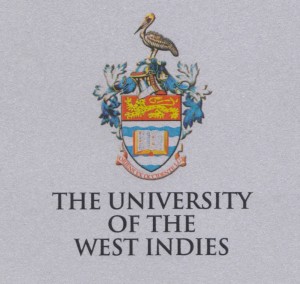 Since its inception in 1948, The University of the West Indies (UWI) has evolved from a fledgling college in Jamaica with 33 students to a fully-fledged, regional University with over 50,000 students. Today, The UWI is the largest, most longstanding higher education provider in the Commonwealth Caribbean, with three physical campuses in Barbados, Jamaica, Trinidad and Tobago, and an Open Campus. The UWI serves 17 English-speaking countries and territories in the Caribbean: Anguilla, Antigua and Barbuda, The Bahamas, Barbados, Belize, Bermuda, The British Virgin Islands, The Cayman Islands, Dominica, Grenada, Jamaica, Montserrat, St. Kitts and Nevis, St. Lucia, St. Vincent and the Grenadines, Trinidad and Tobago, and Turks and Caicos. The UWI’s faculty and students come from more than 40 countries and The University has collaborative links with 160 universities globally; it offers undergraduate and postgraduate degree options in Food and Agriculture, Engineering, Humanities and Education, Law, Medical Sciences, Science and Technology and Social Sciences. The UWI’s seven priority focal areas are linked closely to the priorities identified by CARICOM and take into account such over-arching areas of concern to the region as environmental issues, health and wellness, gender equity and the critical importance of innovation. Website: www.uwi.edu |(Please note that the proper name of the university is The University of the West Indies, inclusive of the “The”, hence The UW
Since its inception in 1948, The University of the West Indies (UWI) has evolved from a fledgling college in Jamaica with 33 students to a fully-fledged, regional University with over 50,000 students. Today, The UWI is the largest, most longstanding higher education provider in the Commonwealth Caribbean, with three physical campuses in Barbados, Jamaica, Trinidad and Tobago, and an Open Campus. The UWI serves 17 English-speaking countries and territories in the Caribbean: Anguilla, Antigua and Barbuda, The Bahamas, Barbados, Belize, Bermuda, The British Virgin Islands, The Cayman Islands, Dominica, Grenada, Jamaica, Montserrat, St. Kitts and Nevis, St. Lucia, St. Vincent and the Grenadines, Trinidad and Tobago, and Turks and Caicos. The UWI’s faculty and students come from more than 40 countries and The University has collaborative links with 160 universities globally; it offers undergraduate and postgraduate degree options in Food and Agriculture, Engineering, Humanities and Education, Law, Medical Sciences, Science and Technology and Social Sciences. The UWI’s seven priority focal areas are linked closely to the priorities identified by CARICOM and take into account such over-arching areas of concern to the region as environmental issues, health and wellness, gender equity and the critical importance of innovation. Website: www.uwi.edu |(Please note that the proper name of the university is The University of the West Indies, inclusive of the “The”, hence The UW
In Inaugural Address, Sir Hilary Beckles Calls for Rekindling the Caribbean’s Spirit of Self-Determination
Address delivered by Professor Sir Hilary Beckles on the occasion of the Special Convocation for his Installation as the 8th Vice Chancellor of the University of the West Indies, held at the Usain Bolt Sport Complex, Cave Hill Campus, the University of the West Indies, Barbados, Saturday 30th May, 2015.
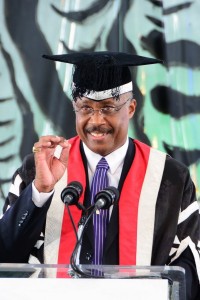 Chancellor Sir George and Lady Alleyne; the Rt. Honorable Prime Minister of Barbados, Mr Freundel Stuart; the Rt. Honorable Prime Minister of The Bahamas, Mr Perry Christie; the Rt. Honorable Prime Minister of St. Vincent and the Grenadines, Dr. Ralph Gonsalves; ministers of government and other parliamentarians; members of the Diplomatic Corp; Lady Beckles and members of my family; colleagues of our beloved university; President of the West Indies Cricket Board; members of the international community; Chancellor Emeritus Sir Shridath and Lady Ramphal; students and alumni; distinguished ladies and gentlemen, good afternoon.
Chancellor Sir George and Lady Alleyne; the Rt. Honorable Prime Minister of Barbados, Mr Freundel Stuart; the Rt. Honorable Prime Minister of The Bahamas, Mr Perry Christie; the Rt. Honorable Prime Minister of St. Vincent and the Grenadines, Dr. Ralph Gonsalves; ministers of government and other parliamentarians; members of the Diplomatic Corp; Lady Beckles and members of my family; colleagues of our beloved university; President of the West Indies Cricket Board; members of the international community; Chancellor Emeritus Sir Shridath and Lady Ramphal; students and alumni; distinguished ladies and gentlemen, good afternoon.
I begin, Chancellor, with an acknowledgement of a fundamental truth.
It is this. Universities are not built to serve themselves. They are built and resourced to serve their communities and nations. Our beloved UWI was built and sustained in order to serve the people of the Caribbean. It is in every way a Caribbean university. We are a Caribbean nation; one people; a unified civilization.
An acknowledgement of these truths has shaped the inner and outer dimensions of my life. I am a Caribbean academic and public worker. I have dedicated my energies to the advancement of our Caribbean nation. This has been my intellectual center of gravity. It runs through the history of our university for near four decades.
I have had the honor of defining myself within the context of the history of our fine university. It is, as the late Rex Nettleford frequently reminded us, the greatest gift Caribbean people have given themselves. I began and grew as an academic within its walls, and was nourished within its generous community. I was nurtured with its spirit of community commitment and engagement. I am a disciple of its discursive personality and has benefitted from its enormous prestige. I am grateful. I am honored.
My colleagues and stakeholders of our noble academy have asked that I serve in the role of Vice Chancellor; to be the 8th person called to this office and duty. I say ‘duty’ Chancellor because I do not believe for a moment that this function is a job; it is an act of service and duty. I am honored to be invited. I shall do my very best with every drop of energy and sensibility that exists within my being.
“I am in every way a Caribbean man”
Chancellor I bring to this service my specific and peculiar social construction and intellectual constitution. I am in every way imaginable a Caribbean man, not simply a man from the Caribbean. I was born and ‘brought up’ in Barbados but grew to maturity within the integrated Caribbean community of the English diaspora.
At the age of 13 years I was disconnected from the nurture of my Barbados roots in the deep, rural village of Rock Hall, in the parish of St. Andrew, and thrown into the Caribbean world of inner city Birmingham where I was culturally refashioned and my identity enlarged. I had received an excellent education at the Black Bess Primary School, and the Coleridge and Parry Secondary School. They prepared me well for the English encounter. I discovered my West Indianness in the school and on the streets of Birmingham. Since then the Caribbean has been my inner home.
I returned home from home, via Jamaica, to the Mona campus of our university. I was more than an historian of the Caribbean people; I had become a product of the Caribbean. Within this context I became a servant of our university. Culturally Caribbeanized, I embraced Jamaica as I do all our societies. I erupted intellectually within the turbulence of our academic culture. Service has been my salvation.
We are situated at a moment in our development that can be defined in terms of its distance from the colonial scaffold that held us captive for over three hundred years. We are preparing to enter the second seismic phase of our political independence project. We are dedicated to the advancement of our nationhood within a galloping globalized circumstance. In this regard, as a university, we are preparing to push our region deep into this century.
A Sense of Despair on the Horizon
Our economies, more so than most, have been ravished by the global economic recession; we appear most sluggish in terms of our emergence. Our economies seem less competitive than in previous decades; a sense of despair has appeared on the horizon. Many of the gains we have won through hard and painful struggle are being eroded; there is a growing sense of dismay among our youth.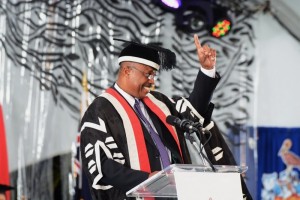
In some academic quarters it is being said that our development agenda has stalled; that we have ran out of energy and ideas. Rudderless, they say, our region is adrift and bereft of a basic plan of action. In fact, some have concluded that the Caribbean is now a classic example of a stressed culture; that it is more likely to implode into social chaos than explode with creative possibilities.
To all of this I say that the most effective response is to rekindle the Caribbean revolutionary spirit that has brought us thus far. To rekindle this spirit is to reenergize the intellectual struggle for self-reliance. It is to rekindle the spirit of the struggle for economic self-determination, the democratization of economic ownership, and the quest for greater sovereignty and self-responsibility.
The Caribbean spirit of self-determination calls for a furtherance of the democratic spirit in which we celebrate the rise of the ordinary man and woman in the street as a citizen with energy and ideas to shape and mold the trajectories of our communities.
“I understand the pain of crippling poverty”
It insists that we are one people, one nation, creators of a civilization influenced by all and fertilized by many, but inferior to none, and therefore equal to all. We must, therefore, rekindle that Caribbean spirit that drove us out of bondage-slavery, indenture, and colonialism-and which possesses that which is required to fashion a 21st Century consciousness that is focused, determined and self-directing.
Chancellor, I am a social product of the material poverty that has been the lot of the majority of our citizens. Like many gathered here today, and those listening to this broadcast, I grew as a child surrounded by the threat of hunger. I walk to school with my bare feet upon the ground. I understood first-hand the pain of crippling poverty. I am, as Martin Carter says, a son from the nigger yard of yesterday.
But embedded within my tender mind and emerging mentality was a clear, crystallized truth: that the poverty of my person had nothing to do with the richness of my mind. There was no fear in my interior that the scarcity around me could cripple my consciousness. It never interred my mind that the absence of money could contain the content of my imagination. I knew and felt keenly that I was from tested, sturdy stock, being raised by men and women who understood that the future was ours to grasp.
I was born within a family possessed of the philosophy that better will come, and that we shall overcome. After 40 years of labor in Britain my parents have returned to their community. My mother is here. My father, just one cricket stoke away from his century, is here. I am honored to be their son. I am grateful that they are here. I am here because they have brought me here.
The commitment to education within our family knew no boundaries. Making something of oneself out of nothing seemed at first a hard proposition. But at an early age, I realized the extent to which I possessed everything a child needed. I had good health, was invested with a love of reading and learning, and possessed of the philosophy of self-improvement.
I have five loving sisters- Silma, Belinda, Lorna, Barbara, Sonia, and an older brother, John. Belinda and John are here tonight. I am the middle child of seven, the perfect location from where to receive love from above, and to pass it on below.
My grandparents who raised me while my parents were preparing a place across the seas were as perfect in their parenting as can be imagined. My grandmother who I loved dearly was the village preacher who taught me the importance of moral purpose and social commitment. My grandfather, a cane cutter, demonstrated daily the importance and imperative of hard work. My father, an old school master tailor, taught me the art of concentration, self-discipline and love of precision. From my mother I inherited a keen sense of social responsibility. I am what they have made me.
My wife, Mary, Lady Beckles, gave me all the support in my formative years as I pursued the illusive concept of academic excellence, and the tortured passion to make a contribution to public life. It has been demanding. I am grateful for her sacrifice, her encouragement, and critically her tolerance as I tried relentlessly to master the craft of research and writing history.
We have two sons, Rodney Beckles and Biko Beckles, good and handsome men. We love them dearly. They in turn have given us the joy of two grandsons, Tajari Beckles Elisah Beckles, and a granddaughter, Hilary Beckles.
To my wife, my father and mother, my brother and sisters, my sons, and my grandchildren, I say thank you for the love and the latitude that has enabled me to journey to this moment.
“Our university was built to serve the people of the Caribbean”
Chancellor, we have a great deal of work to do. As a university we have our work cut out for us. Our top priority has to be working intimately with our wealth creators in order to drive our region out of economic recession.
The university has to do even more than it has done in the past. This recession is a threat to all we have achieved. The rebuilding of our economic competitiveness and the achievement of economic growth must be our top agenda items. Our university was built to serve its people. If the economy, the bus in which we are travelling, has found itself in a ditch, then we will all roll up our sleeves and push and pull until it is back on the highway. I give my commitment to this service.
The building of strong industry-academic links as a normal architecture must be addressed with urgency. All those countries that have achieved strong sustainable economic growth with social progress have done so upon platforms of industry- academic networks in which innovation and value creation were prioritized.
Without good applied research there can be no innovation. Without innovation we cannot compete effectively. We have competed successfully in past decades at the levels of prices and quality. We are not competing at the level of innovation, and here in lies that reason for our sluggish performance. The university has to be a part of the solution.
“Commitment to the uprooting of poverty in our region”
Chancellor, I am calling for the deeper commitment of our university to the purpose of wealth creation. I am also calling for a deeper commitment to the uprooting of poverty in our region. There is simply too much poverty in our midst, and it is increasing across our region. We must not become adjusted to it. We must not accept it as a norm. We must see to it that every child can find a way forward to make a contribution through education. We need to dream that one day there will be at least one graduate of our universities and colleges in each and every household.
These households must be deemed knowledge household. Such domestic environments must be possessed of students, graduates, and the technologies of learning-computers and internet. Only such households can be the building block of our economic development and social progress.
We must not retreat, therefore, from the principles of the Caribbean dream. I am calling also for a rekindling of our intellectual engagement, a necessary condition for the second renaissance. Our thinkers must connect to the excellent work already done and use it in order to find new sources of energy. They must be unafraid, and live beyond the boundaries of intimidation. Young 21st century intellectuals must present our region with conceptual and practical choices, new and radical alternatives. They must rise with reason and restore that which matters most- our love of liberty and social justice.
Within this context the education revolution that has brought us this far must be reenergized. We have a crisis before us. In our English speaking section of the hemisphere we have the lowest enrolment in higher education. We are at the bottom of the pile in terms of the number of citizens between the ages of 18 and 30 enrolled in higher education. In some countries percentages are falling.
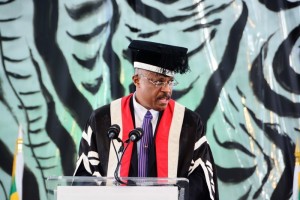 “We are still cleaning up the mess of colonialism”
“We are still cleaning up the mess of colonialism”
But we know that the potential of a country for growth and development is a function of the number of its citizens who are participating in the world of professional development, training, and academic tutelage. We have a crisis and we must address it frontally. We have no time to waste, not now!
Much of this has to do with the undeniable truth that we are still leaning up the mess of colonialism. We must stop burying our heads in the sand and stand with resolve for the claim of reparatory justice as a development strategy to facilitate the mess cleaning. Our university was established in 1948 as a part of the process of reparatory justice within the anti-colonial context. It has a further role to play in building the discourse and creating the economic arrangement and social rightness for reparatory justice.
Those who have impoverished this region must return and facilitate the orderly efforts we are making to advance. It is owed to the region. It must be requested and used as a part of the restructuring of economies and mentalities within the region. Sir Arthur Lewis, our first Vice Chancellor made this point. In his 1938 book, “Labour in the West Indies”, he argued that the 200 years of unpaid slave labor has to be addressed as part of the region’s economic development. I am honored to be a part of the Lewis tradition as an economic historian and vice Chancellor of this beloved university.
This is a galloping global age, but we must be clear. The building blocks of globalisation remain the nation-state. The Caribbean nation has to find its way as one. Our UWI must more than ever function and operate as one, not four separate universities but one indivisible academy. To this restoration of the singularity of our university my colleagues and I are committed.
“We must build a global university for our region”
Furthermore, it must be a global university for our region, unrelenting in its commitment to internationally respected standards of excellence in all it does. Our graduates must continue to embrace the world and perform upon its stage. Our Caribbean story is without doubt worthy of world narration. Already familiar with this terrain our students, graduates, and scholars must carry the light of our literature even further and deeper into the world’s imagination.
To our students I say this; we shall do all we can to hold you close to our heart because we know that you will make us all proud. To your families I say, do not despair but keep alive in your children a love of learning and we will create for them a space within which they can be nurtured and matured.
Chancellor, I wish to celebrate all those who have walked this journey for our university and region. Our chancellors and vice-chancellors have left being a legacy of respect for this great academy. I honor their roles and will do my best to respect and sustain their excellence. We are custodian of a great truth; that the UWI was built by men and women of the highest quality who served tirelessly without an interest in reward.
In my junior years I was mentored by many colleagues. I received at Mona the most perfect mentoring. I was the rookie in an all-star department of historians that included Barry Higman, Douglas Hall, Neville Hall, Carl Campbell, Patrick Bryan, Elsa Goveia, Roy Augier, Kamau Brathwaite, and David Buisseret.
But it was professor Woodville Marshall who guided me closely along the narrow road of respect for the methodologies of historical research and writing. In my senior years I was mentored as an administrator by Sir Keith Hunte, Sir Alister McIntyre and the Honorable Rex Nettleford. I thank them, Chancellor, as I thank you for the wisdom and dignity you bring to the affairs of our university. You, sir, are a master of the light touch, influencing all but interring with none.
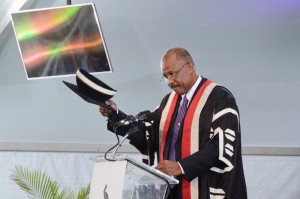 “We are one people, one university, one civilization”
“We are one people, one university, one civilization”
We are gathered here at the Usain Bolt Stadium. This place is a performance facility for sport, a monument to a Caribbean man, a genius of his generation. Dr Bolt has assured me that he will soon journey here to formally open this facility. I am honored to link this event to his eternal excellence. The playing fields at the Mona campus were named in the 1960s in honor of the great Caribbean man from Barbados, Sir Frank Worrell. Today we say in response to the enlightenment and generosity of Mona and Jamaica, the compliment has been returned because we are one people, one university, one civilization.
Chancellor, it is an honor to serve our university, our people, and our region. It’s a service I do not take lightly or for granted. I am blessed to be brought hither. I shall serve to my capacity.
Ladies and gentlemen,
I thank you.

